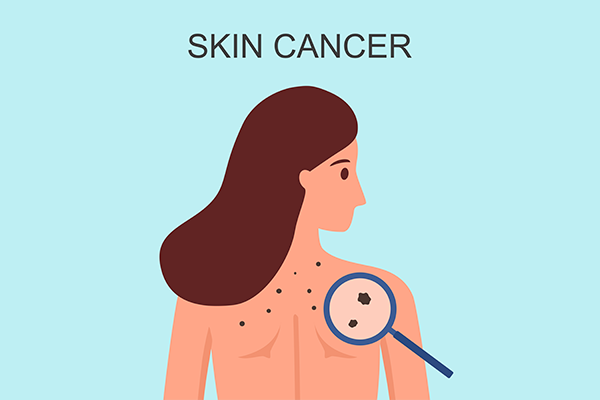
Skin cancer is one of the most common forms of cancer worldwide, yet it is also among the most preventable and treatable when caught early. Many people often associate it with moles changing in size or colour, but skin cancer symptoms can sometimes be less obvious—such as persistent itching, rashes, or even unexplained irritation.
Understanding the early warning signs, risk factors, and treatment options can make a huge difference in outcomes. If you’ve ever wondered whether rashes or itching could be a sign of skin cancer, here’s what you need to know.
Synopsis
Early-Stage Skin Cancer: What to Look Out For
In its early stages, skin cancer may not cause pain or noticeable discomfort. Instead, it often shows subtle changes on the skin’s surface. Key signs to watch for include:
-
New growths that don’t heal within a few weeks.
-
Changes in existing moles—asymmetry, uneven borders, colour variation, or an increase in size.
-
Sores or patches that bleed easily, crust, or don’t heal properly.
-
Persistent itching or irritation, especially in one spot.
Catching skin cancer early significantly increases the chances of successful treatment. Dermatologists often say, “When in doubt, check it out.”
Can Rashes and Itching Be a Symptom of Skin Cancer?
Not all rashes or itchy patches are a cause for concern—most are related to allergies, eczema, or dry skin. However, some forms of skin cancer can cause itching, irritation, or rash-like symptoms.

What cancer can cause itchy skin?
-
Basal Cell Carcinoma (BCC): Often appears as a pearly bump or patch that may itch.
-
Squamous Cell Carcinoma (SCC): Can feel tender, scaly, or itchy.
-
Melanoma: Usually changes in an existing mole, but some patients report itching or bleeding.
-
Cutaneous Lymphoma: A rarer form of skin cancer that commonly causes red, itchy patches.
If you notice itching that persists for weeks, especially with visible skin changes, it’s worth consulting a dermatologist.
Main Skin Cancer Types
There are several types of skin cancer, each with different behaviours and risks:
Basal Cell Carcinoma (BCC):
-
It is the most common and slow-growing.
-
Rarely spreads but can cause local damage.
-
appear as shiny bumps, open sores, or red patches.
Squamous Cell Carcinoma (SCC):
-
Second most common.
-
May spread if untreated.
-
Often looks like scaly patches, warts, or persistent sores.
Melanoma:
-
The most aggressive type.
-
It can spread to other organs quickly.
-
Often linked to changes in moles.
Merkel Cell Carcinoma & Others:
-
Rare but fast-growing cancers.
-
Appear as firm, painless nodules.
Common Causes of Skin Cancer
Several factors increase the risk of developing skin cancer:
-
Excessive UV exposure from the sun or tanning beds.
-
Fair skin or light-coloured eyes.
-
Weakened immune system.
-
Genetic predisposition (family history).
-
Exposure to harmful chemicals like arsenic.
Wearing sunscreen, protective clothing, and avoiding peak sun hours are simple steps that can lower risk.
Is Skin Cancer Curable?
The good news is that skin cancer is often curable, especially when detected early. The treatment depends on the type and stage:
-
Surgery – removal of the cancerous lesion.
-
Mohs surgery – precise removal of cancer while preserving healthy tissue.
-
Radiation therapy – for cases where surgery isn’t possible.
-
Topical treatments or cryotherapy – effective for superficial cancers.
-
Immunotherapy and targeted therapy – for advanced melanoma.
With early diagnosis, survival rates are high. Even advanced cases now have more treatment options thanks to medical advances.
When to See a Dermatologist
Seek medical advice if you notice:
-
Any new mole or spot that looks unusual.
-
Persistent itching or rash that doesn’t go away.
-
A sore that bleeds, scabs, or doesn’t heal.
-
Changes in the colour, shape, or size of a mole.
Dermatologists use tools like dermoscopy, biopsy, and imaging to confirm diagnosis.
How Manipal Hospitals Can Help
At Manipal Hospitals Pune, dermatology experts combine advanced diagnostic tools with personalised care to ensure accurate detection and treatment of skin cancers. Whether you need a routine skin check, mole mapping, or advanced treatment such as Mohs surgery or targeted therapy, our specialists are equipped to provide world-class care.
If you are based in Pune, you can visit Manipal Hospital Pune for comprehensive dermatology and cancer care services. Early consultation with an expert can make all the difference.
While most rashes and itching are harmless, being aware that they can sometimes signal early-stage skin cancer is important. Prevention, awareness, and timely medical care are key to managing risks. Regular skin checks, protective habits, and consulting a dermatologist at the first sign of change can help ensure peace of mind and better health outcomes.
Conclusion
If you’re worried about any skin changes, book a consultation with the Manipal Hospitals Pune dermatology team for expert advice and timely treatment.
FAQ's
Not necessarily. Most itching is due to dryness, allergies, or skin conditions. However, persistent or unexplained itching, especially with visible skin changes, should be checked by a doctor.
It can appear as a new bump, sore, scaly patch, or mole that changes in colour, size, or shape.
Melanoma is the most aggressive and life-threatening, but early detection dramatically improves survival rates.
Superficial cancers may be treated with topical creams, photodynamic therapy, or cryotherapy. However, surgery remains the most effective option for many cases.
Dermatologists recommend an annual skin check, especially for those with fair skin, a history of sunburns, or a family history of skin cancer.






















 5 Min Read
5 Min Read















